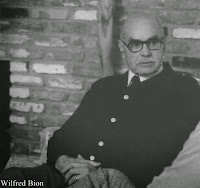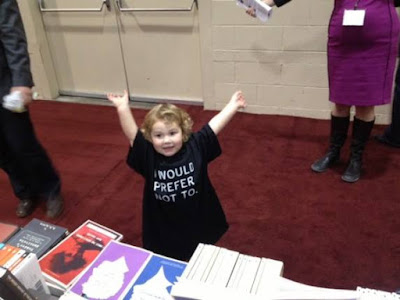“…To prevent someone who KNOWS from filling the empty space.”
―
Wilfred Bion
‘Comparing my own personal experience with the history of psychoanalysis, and even the history of human thought, it does seem to be rather ridiculous that one finds oneself in a position of being supposed to be in that line of succession, instead of just one of the units in it. It is still more ridiculous that one is expected to participate in a sort of competition for precedence as to who is top. Top of what? Where does it come in this history? Where does psychoanalysis itself come? What is the dispute about? What is this dispute in which one is supposed to be interested? I am always hearing – as I always have done – that I am a Kleinian, that I am crazy; or that I am not a Kleinian, or not a psychoanalyst. Is it possible to be interested in that sort of dispute? I find it very difficult to see how this could possibly be relevant against the background of the struggle of the human being to emerge from barbarism and a purely animal existence, to something one could call a civilised society’.
(Shortly before his death, reported by Francsca Bion here.
Memory is born of, and only suited to, sensuous experience. As psychoanalysis is concerned with experience that is not sensuous – who supposes that anxiety has shape, colour or smell? – records based on perception of that which is sensible are records only of the psychoanalytically irrelevant. Therefore in any account of a session, no matter how soon it may be made after the event or by what means, memory should not be treated as more than pictorialized communication of an emotional experience.”
(From Second Thoughts)
“It is very important to be aware that you may never be satistied with your analytic career if you feel that you are restricted to what is narrowly called a ‘scientific’ approach. You will have to be able to have a chance of feeling that the interpretation you give is a beautiful one, or that you get a beautiful response from the patient. This aesthetic element of beauty makes a very difficult situation tolerable.”
(from A Seminar held in Paris)
Restricting ourselves to verbal intercourse won’t get us far with a silent patient. What kind of psychoanalysis is needed to interpret the silence? The analyst may think there is a pattern to the silence. If he cannot respect the silence, there is no chance of making any further progress. The analyst can be silent and listen – stop talking so that he can have a chance to bear what is going on.
…
Some silences are nothing, they are 0, zero. But sometimes that silence becomes a pregnant one; it turns into 101 – the preceding and succeeding sounds turn it into a valuable communication, as with rests and pauses in music, holes and gaps in sculpture.
Bion about Groups:
From “Experiences in Groups.” The main theme of the last part of the book is the discussion of Freud’s ideas about primitive Oedipal conflicts, part-object relations and psychotic anxieties. Here is Bion: ‘Freud’s view of the dynamics of the group seems to me to require supplementing rather than correction‘ (Bion, Experiences in Groups. 1955, p. 475). He accepts Freud’s claim that the family group is the basis for all groups but adds:
“this view does not go far enough… I think that the central position in group dynamics is occupied by the more primitive mechanisms which Melanie Klein has described as peculiar to the paranoid-schizoid and depressive positions. In other words, I feel… that it is not simply a matter of the incompleteness of the illumination provided by Freud’s discovery of the family group as the prototype of all groups, but the fact that this incompleteness leaves out the source of the main emotional drives of the group.”
Further investigation shows that each basic assumption contains features that correspond so closely with extremely primitive part objects that sooner or later psychotic anxiety, appertaining to these primitive relationships, is released. These anxieties, and the mechanisms peculiar to them, have already been displayed in psychoanalysis by Melanie Klein, and her descriptions tally well with the emotional states.
Such groups have aims far different either from the overt task of the group or even from the tasks that would appear to be appropriate to Freud’s view of the group as based on the family group. But approached from the angle of psychotic anxiety, associated with phantasies of primitive part object relationships… the basic assumption phenomena appear far more to have the characteristics of defensive reactions to psychotic anxiety, and to be not so much at variance with Freud’s views as supplementary to them. In my view, it is necessary to work through both the stresses that appertain to family patterns and the still more primitive anxieties of part object relationships. In fact I consider the latter to contain the ultimate sources of all group behaviour (p. 476). “
In Bion’s view, then, what matters in individual and group behaviour is more primitive than the Freudian level of explanation. The ultimate sources of our distress are psychotic anxieties, and much of what happens in individuals and groups is a result of defenses erected against psychotic anxieties, so that we do not have to endure them consciously. Bion says of the group:
“My impression is that the group approximates too closely, in the minds of the individuals composing it, to very primitive phantasies about the contents of the mother’s body. The attempt to make a rational investigation of the dynamics of the group is therefore perturbed by fears, and mechanisms for dealing with them, which are characteristic of the paranoid-schizoid position. The investigation cannot be carried out without the stimulation and activation of those levels… the elements of the emotional situation are so closely allied to phantasies of the earliest anxieties that the group is compelled, whenever the pressure of anxiety becomes too great, to take defensive action (Bion, 1955, p. 456).”
The psychotic anxieties in question involve splitting and projective identification and are characteristic of the paranoid-schizoid and depressive positions, now as group processes (p. 457). According to Bion, the move from the individual to the group does not raise new issues about explanation. He says a little further on, ‘The apparent difference between group psychology and individual psychology is an illusion produced by the fact that the group brings into prominence phenomena which appear alien to an observer unaccustomed to using the group’ (p. 461).




